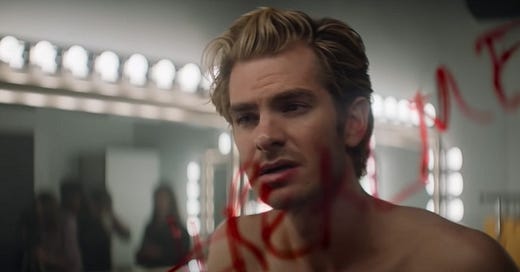Some version or other of this newsletter has been sitting, unfinished, in my drafts for a few weeks now and even writing this I feel a real lack of motivation or pleasure. I just feel a need to put something out. My current downtrodden state is partially my fault — taking on too much, doing too much, spending too much — and then feeling anxious and off-kilter. But before this current downward trend, I was watching and enjoying movies and so I want to chat a little about two of them I watched (semi) recently: Gia Coppola’s Mainstream and Maggie Gyllenhaal’s The Lost Daughter.
Mainstream (2020), dir. Gia Coppola
I watched Mainstream in the last few weeks of the year when, after watching The French Dispatch, I had a sudden burst of desire to watch movies all day. I’ve wanted to see it ever since watching the trailer gave me a real thrill! Mainstream has all the elements that speak to me—a YouTube plotline and Nat Wolff as a good guy (Stuck in Love, anyone?). The film stars Andrew Garfield as a wise but egotistical drifter who catches the interest of a young woman, Frankie, played by Maya Hawke. Up until their meeting, Frankie has been trying to make it on YouTube, making silly little videos that get 48 views at most. When she meets Link (Garfield) she is drawn by his charisma and his seeming disinterest in everything we’re supposed to believe is a trapping — money, fame, the internet. The two start making videos together alongside Frankie’s co-worker and friend, Jake (Wolff), who is obviously in love with Frankie and quickly become sensations on YouTube.
As a film, Mainstream is interesting for its use of digital graphics and interfaces, as well as its glitch aesthetics. At times, it feels like a very high budget, glossy Emma Chamberlain video. As a polemic—which it comes across as—it’s confusing. On one hand, it seems to be agreeing with its central characters that the internet has not only rotted our sense of reality and our attention centers but has made us amoral, unwilling to question how our consumption of certain online artifacts is harmful. On the other, it seems to suggest that those who make a big spectacle of bringing attention to this moral crisis are hypocritical, merely feeding the ecosystem. A strange take because that’s exactly what the film is doing. This confusion makes for a film that feels disjointed and therefore less entertaining, which may be the point. I personally think they should have released it for $free.99 on YouTube which would have been excellent marketing and would have probably ensured anyone saw it. (This film had a $5 mill. budget and made $43k in the box office so it’s either a cult classic or a flop!)
The Lost Daughter (2021), dir. Maggie Gyllenhaal
I watched The Lost Daughter on New Year’s Day and I’m not sure if the mostly unceremonious nature of my New Year’s (my friend and I realized it was midnight when we saw fireworks outside her window, quickly took some photos, and went back to watching Twilight) or the mellow energy of the day but afterwards, I found myself uncertain about where I stood. Throughout the film, I’d had no real emotional experience. Rather, I felt myself sort of performing reactions — I was watching with a group of friends — to demonstrate that I knew what was going on. Afterwards, I tried to reconcile my viewing experience with the multiple reactions I had seen online that suggested its brilliance and failed. I wanted to be knocked over! I wanted to feel breathless! Instead, I mostly felt confused.
To me, The Lost Daughter feels like what happens when a director makes a lot of smart choices that objectively show some sort of insight but have no real effect. There are lots of symbols and extreme close ups and grating sound cues but they don’t come together for a cohesive emotional assault. Because The Lost Daughter is an adaptation of the Elena Ferrante novel of the same name, as I thought about the film, I couldn’t help but think of Ferrante’s other novels. Specifically, her novel Days of Abandonment which was so emotionally intense it made me feel like life was impossible, like I was drowning. I felt the protagonist’s desperation as she batted away her whining children, as she made senseless and unfulfilling flirtations. That immersion of feeling was missing in Gyllenhaal’s film; despite its many close-ups and moments of tense confrontation, deep discomfort was never sustained — we were pulled out of any discomfort before it could latch on and make us sick. Without that, the last moments of the film — the tension of confrontation and honesty, the suspense of Leda’s escape, and the relief of the final warm and sunlit scene — lose their power. They whimper and whine, kind of like Leda does after being bullied by a group of Greek teens.
Thanks for reading, this week and always. If you haven’t yet, check out Sonja’s guest post on her favourite YA fiction!




